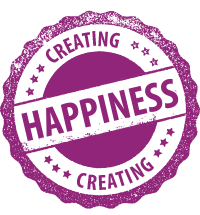It might just mean that you don’t have the tools to move through conflict.
I often feel upset (and it drives me crazy, to be honest) when I come across the narrative in our culture that because you have conflict in your relationship, it means that you are with the wrong person and need to find a person who is a better fit.
Conflict is not the problem, all that conflict means is that growth wants to happen and you don’t have the tools to facilitate that.
In every genuine relationship, once you have moved beyond the honeymoon stage (which happens to all relationships sooner or later), there will be a time where there is conflict – it is unavoidable.
It does not mean that you are with the wrong person, but it does mean that the relationship needs attention and the needs, of at least one of the partners, are no longer met. The relationship is moving from the honeymoon stage to the stage of the power struggle.
The time of the power struggle is a catalyst for the couple. If they don’t have the tools, it will be very painful and often leads to the end of the relationship. However, if the couple learns the tools of productive and respectful communication and conflict resolution, then they will move from that difficult place to a deeper, more mature, love and soul connection.
This is the most satisfying place to be – it is bliss! I often start tearing up when I see couples during session move from the place of the power struggle to that beautiful place of genuine connection. It is the most amazing thing to witness – like a piece of heaven materializing right in front of me.
In other words, if conflict is done right, intimacy and connection increase and the relationship gets stronger.
Most of us have not been shown by our parents what productive and respectful communication looks like (me included). However, we live in such an amazing time, that if you want to learn how to do relationships well, we know how to do that – and it can be taught in therapy.
If there are two willing partners, who are open to working on themselves and are committed to being truthful with each other, the sky is the limit.
Back to the myth that we are with the wrong person if we experience conflict.
According to Imago Relationship Therapy therapy, we are always with the “right” person, as we are subconsciously attracted to people who hold our optimal growth potential. That is, we are attracted to people who will allow us to recreate some of the most painful dynamics of our childhood. We do that because subconsciously, we long to finally find healing and grow.
For example, if you grew up with a mother that had narcissistic tendencies, you never felt heard, had no voice, you needed to focus on keeping her happy and there was no room for your needs, you most likely will recreate that dynamic with your romantic partner.
You might again feel like you have no voice and there is no space for your needs. Or, the dynamic might flip and you will become like your mom in the relationship, and your partner feels like there is no room for his/her needs and it is all about what you want.
That’s why when I meet clients in couple therapy, they frequently will say things like, “She is just like my dad, or he is just like my mom”. These clients have recreated painful relational dynamics from their childhood with their partner, are getting stuck there, and are not sure now how to move through them and heal their relationship.
If you want to understand more about the subconscious dynamics that lead you to your partner, a great book to read is, Getting The Love You Want by Harville Hendrix, who is the founder of Imago therapy.
Here are some suggestions on how to start the process of moving from the power struggle to reestablish a genuine, intimate connection:
1. Move away from who is right or wrong.
As soon as it is about who is right or wrong, you are automatically stuck in a power struggle. All of our perceptions are different and they are also equally valid.
The fact is, that I will always make sense to myself in my world, and my partner will always make sense to himself in his world. Arguing about whose view is right, is a waste of time. Instead, focus on building a communication bridge from one world to another, being curious and wanting to understand the other person’s point of view.
2. Move from judgment towards curiosity.
When working with couples, I always emphasize the importance of putting an emphasis on curiosity when listening to your partner. Because curiosity and judgment are very hard to hold at the same time, let the latter go.
Holding a curious attitude will allow you to better understand what your partner is experiencing and see your partner’s experience as an enrichment to your own, as it adds to it, instead of seeing it as a threat. Be open to learning from your partner’s experience, to discover new aspects.
3. Have an attitude of respect and goodwill.
When your partner is sharing, stay calm and curious, refrain from eye-rolling, sighing, or saying things like, “Are you done yet?”, “What, there is more?”. If you want your partner to come to you and share his/her experience with you, you need to be a safe place. You are a safe place by being warm and inviting, and providing your partner with all the time he/she needs to express himself/ herself fully.
4. Share your truth.
Healing is only possible in a relationship if both partners are willing to share their truth, which can be really scary because by sharing your inner experience means you become vulnerable.
Most of us long for intimacy, but are also scared of intimacy, because the people who have been closest to us have hurt us the most in the past. Taking the risk and sharing what is truly going on inside of you is an essential step in the healing process.
5. Validate your partner’s experience.
Validating your partner’s experience does not mean that you are agreeing. It simply means to let your partner know that he/she makes sense to you. Remember, you can always validate your partner’s experience, because your partner is human, and every human makes sense.
If you would talk to a suicide bomber long enough, he or she would make sense to you in his or her world. Everybody makes sense to themselves.
If you can’t validate your partner’s experience, then you need to ask more questions. When you validate, you could say something like, “Makes sense that you see it that way, considering that …”. It is the opposite of saying, “Why the heck do you feel/think that?!”, “What is wrong with you, how could you ever see it this way?!”.
6. Keep your voice approximately at a speaking level.
When your voice gets too loud or too aggressive, your partner most likely will get triggered and no longer sees you as safe. At that point, his/her defenses come up and the relationship has been interrupted. If necessary, take a short time out to cool down, and return later to continue the conversation calmly.
Next time, when conflict arises in your relationship, remember that this is only GROWTH WANTING TO HAPPEN and see if implementing the above-mentioned tips can make a positive difference. Once you have figured out how to do conflict well in your relationship, intimacy and trust will increase as a result of it.
If you feel like you don’t know how to implement these steps in your relationship, your relationship is going through a crisis, or simply too much has accumulated over a long period of time and you don’t know where to even start, I encourage you to reach out to a therapist who can guide you through this healing journey.
Reference:
Getting The Love You Want: A Guide For Couples (3rd. ed) by Harville Hendrix & Helen LaKelly Hunt (2019)

This post is part of the blog series "Creating Happiness", your inspiration to promote positive change in your life.
Do you like Daniela's posts? Subscribe to her blog series:
ABOUT THE AUTHOR
Ms Daniela Beer-Becker, Psychologist
Daniela is a regular contributor to the Blake Psychology blog and author of the "Creating Happiness" series.
MORE POSTS IN THE SERIES
















